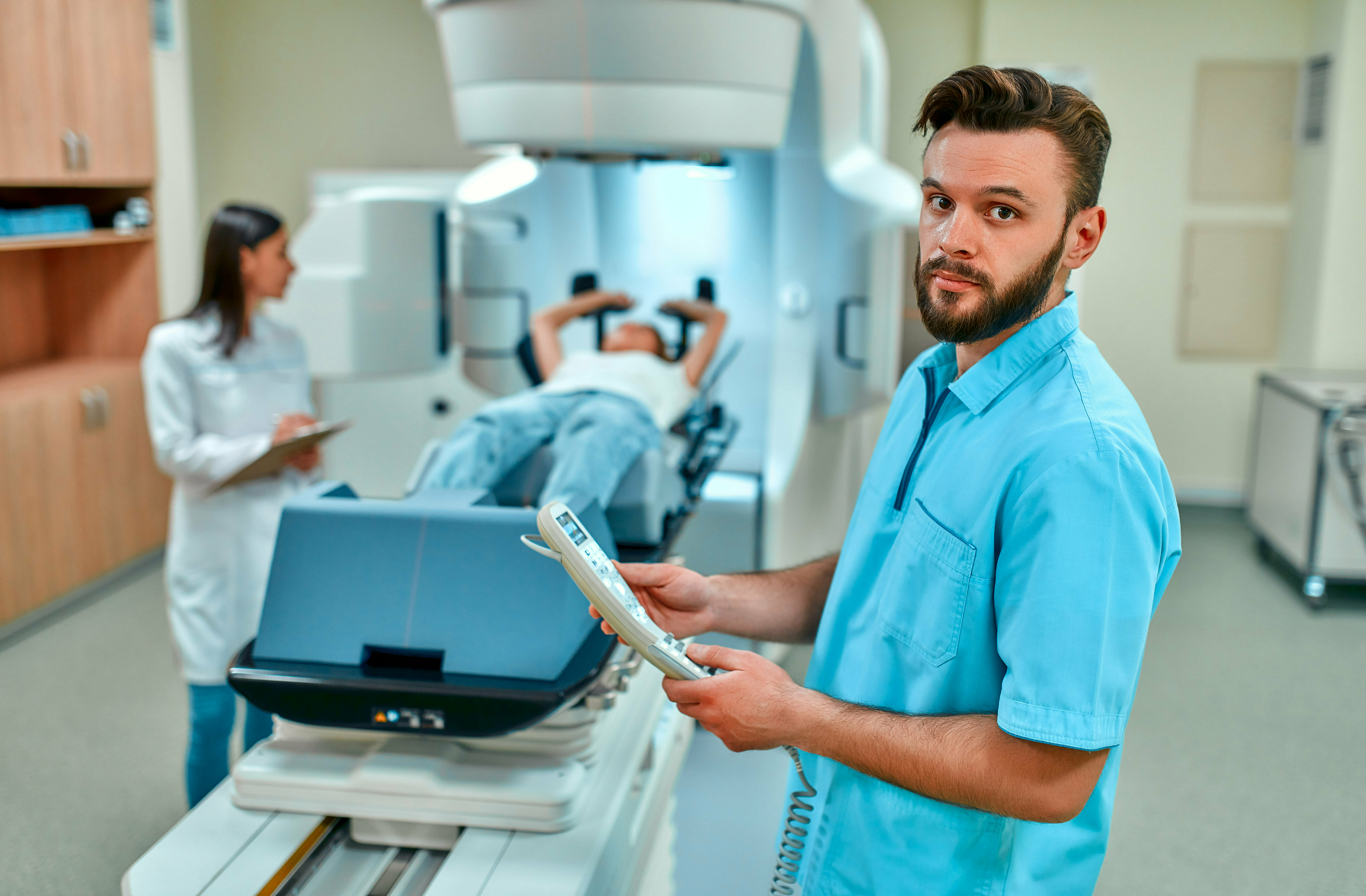Dosimetrist

A medical dosimetrist performs calculations with the goal of creating a treatment plan that maximizes radiation dosage to the patient’s target tissue while minimizing radiation to nearby tissue. Dosimetrists perform their job in collaboration with a medical physicist and a radiation oncologist.
A medical dosimetrist needs knowledge of brachytherapy, radiation oncology simulators, and treatment machines. Some of the dosimetrist’s duties include assisting with brachytherapy, supervising radiation therapists, and performing in-vivo dosimetry.
In This Article
What is a Medical Dosimetrist?
A medical dosimetrist possesses a good overall knowledge of math, physics, anatomy & physiology, radiobiology. Medical dosimetrists also know the characteristics and clinical relevance of radiation oncology treatment machines and equipment.
With their expertise, medical dosimetrists design, generate and measure radiation dose distributions and dose calculations. A medical dosimetrist can do this while providing oversight to high-level treatment procedures in both external beam radiation therapy and brachytherapy.
What Does a Medical Dosimetrist Do?
Medical Dosimetrists design an individualized plan of treatment for cancer patients. They use computer sciences and mathematics to calculate an appropriate dosage and position for the treatment. They also communicate with the patient’s oncologist to ensure accuracy.
To prevent the surrounding tissue from experiencing the same cellular death as the cancerous cells, the radiation therapist positions the patient in the most advantageous way possible. Then, multiple beams of radiation are focused on the patient from different angles. The beams intersect on the cancer cells, allowing for a higher concentration of radiation right where it is needed.
Dosimetrist Salary
According to Salary.com, the average dosimetrist salary in the United States is $121,477 as of May 27, 2021. However, the range typically falls between $111,265 and $131,995. Salary ranges can vary widely of course for a dosimetrist depending on experience and education.
How to Become a Dosimetrist
If you are looking for a way to advance in your career as a radiologic technologist, joining a medical dosimetry program and becoming a medical dosimetrist is a great way to do so. It is a relatively new field that continues to grow.
Because the demand for medical dosimetrists is so huge compared to those getting the certification, it is an opportune field to advance your career. If you have a bachelor’s degree in radiation therapy or radio technology, this program is a way for you to take the next step in your career as a dosimetrist.
In short, being a medical dosimetrist can be thought of as a form of specialization for holders of a degree in radiation therapy. Keep in mind that certification rules must be followed to the letter if you are planning to make a career as a medical dosimetrist.
Education and Training Requirements
The field of medical dosimetry aims at imparting students with the right knowledge on the use of radiation for cancer treatment. Numerous universities and colleges offer certificate and degree completion programs for those wishing to specialize as medical dosimetrists.
Medical dosimetrists must have a degree and state license to practice radiation therapy. A dosimetrist must have knowledge of medical physics and oncology, drawing from math, physics, and biology to form integrated treatment plans.
Employers also look for medical dosimetrists to have good listening and communication skills, teamwork, and problem-solving skills. Medical dosimetrists must be able to work harmoniously with other staff members, including medical physicists, radiation therapists, and radiation oncologists. They must also consider risks in the case of unpredictable results.
If you are seeking certification as a dosimetrist, you must have graduated from a JRCERT accredited program that teaches medical dosimetry. Besides that, you must be a holder of a bachelor’s degree.
The JRCERT accredited programs all run for at least 12 months. To get a dosimetrist certification, you must present the official transcript and the diploma copies from the program where you obtained the dosimetry skills.
After graduation, you are eligible to sit for the medical dosimetrists exam provided by a recognized body. For instance, the American Radiologic Technologists (ARRT) can issue the exam.
Another route for beginning your journey towards a medical dosimetry certification is to have a degree in biology, physics, or a field related to the medical sector. For example, if you have a physics degree, it means you covered areas such as strong and weak nuclear forces, fundamental particles, radioactive decay, and electromagnetism. On the other hand, if you have a biology degree, you were taught about the life cycle, behavior, and structure of living organisms.
All of these are fields that are related to the area of medical dosimetry.
Three-Attempt Rule
The three-attempt rule applies to all medical dosimetrist candidates that have gone through a dosimetry program and wish to get a certification. A dosimetrist candidate that fails the certification on their third attempt is disqualified from seeking certification again for a period of two years. If the medical dosimetry certification exam is offered more than once every year, they are allowed to take the certification exam that many times.
After a dosimetrist candidate waits out the two-year period, they will have to submit a new application for the medical dosimetrist certification exam. Approval will be based on the prevailing conditions of the time. Whether you had qualified for the medical dosimetry exam or not in the past will not be considered.
Sponsored Programs
The College of Health Care Professions , Online
Location - Mcallen, TX, US 78504The College of Health Care Professions is a Texas-based career education school founded by physicians in the Texas Medical Center solely specializing in healthcare education and dedicated to provid... Read More
ProgramsLimited Medical Radiologic Technologist with MA Skills - Certificate
If you aspire to become a medical dosimetrist, you will need to complete courses in the fields of radiation safety, radiobiology, and medical terminology, among many others. If you choose to sign up for a medical dosimetrist program, you will also receive instruction on how to manage patients, the use of the latest medical technology, and how to participate in a medical diagnosis.
A certificate program in medical dosimetry usually lasts for one year. If you want to earn your degree as a medical dosimetrist, it will take much more time.
Programs for training medical dosimetrists that have received JRCERT accreditation are aimed at educated and experienced professionals. If you currently working as a radiotherapist or as a radio technologist, you are a good fit for these programs. Additionally, the medical dosimetrist programs are open to individuals who have a bachelor’s degree in a healthcare-related field or physical science.
The program’s aim is usually to ensure that students can competently sit for Certified Medical Dosimetrist (CMD) test and pass. The certification, which is voluntary, can be accessed via the Medical Dosimetry Certification Board (MDCB). Although not necessary, most employers will require that you have the medical dosimetry certification anyway. If you want to retain the certification, you must engage in continuing education for medical dosimetrists.

